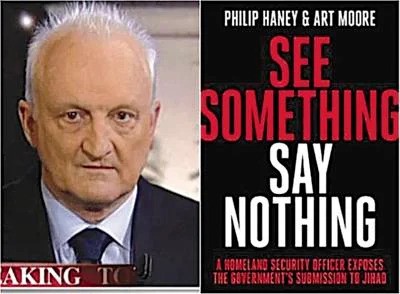
Philip Haney was willing to expose the infiltration of Muslim Brotherhood-connected people within the administration levels within the DHS but his efforts were thwarted and eventually extinguished.
Philip Haney wasn’t your average government employee. A founding member of the Department of Homeland Security (DHS) in 2003, he spent over a decade tracking terrorists, specializing in Islamic theology and the global jihadist movement. His book, See Something, Say Nothing: A Homeland Security Officer Exposes the Government’s Submission to Jihad, published in 2016 with co-author Art Moore, pulled back the curtain on what he saw as a dangerous infiltration of the DHS by Muslim Brotherhood-linked figures—allegedly encouraged by the Obama administration. Haney’s narrative is characterized by bravery, controversy, and a death that continues to arouse curiosity.
A Career Built on Connecting Dots
Haney’s journey began in the Middle East, where he studied Arabic culture and language as a scientist before joining DHS as a Customs and Border Protection officer. By 2009, he was part of the National Targeting Center’s Advanced Targeting Team, earning praise for identifying hundreds of potential terrorists. His knack for “connecting the dots” made him a standout—until it made him a target.
According to Haney, the trouble started when the Obama administration took office. He claimed that Muslim Brotherhood affiliates gained unprecedented influence, pushing policies like Countering Violent Extremism (CVE), which downplayed Islamic extremism as just one of many threats. Haney alleged that in 2009, DHS ordered him to scrub or modify around 850 records linking individuals to Islamist terror groups like Hamas from the Treasury Enforcement Communications System (TECS). His work on groups like Tablighi Jamaat—tied to mosques attended by terrorists like San Bernardino shooter Syed Farook—was erased. Haney argued this wasn’t just bureaucratic overreach; it was a deliberate capitulation to an enemy within.
In See Something, Say Nothing, Haney detailed how this “great purge” crippled national security. He testified before the Senate Judiciary Committee in 2016, warning that attacks like San Bernardino and Orlando might have been prevented if his intelligence hadn’t been suppressed. To Haney, the Obama White House wasn’t just naive—it was complicit, cozying up to the very groups he’d sworn to defend against.
A Whistleblower Silenced?
Haney retired in 2015, but he didn’t go quiet. His book hit shelves, and he became a vocal critic of Obama-era policies, appearing on Fox News and speaking to anyone who’d listen. By late 2019, he was reportedly planning a sequel, promising to “name names” and dive deeper into the swamp. Then, on February 21, 2020, he was found dead in a park-and-ride lot near Plymouth, California, about 40 miles east of Sacramento. He was 66.
The official story? A single, self-inflicted gunshot wound. The Amador County Sheriff’s Office, after a two-year investigation with FBI assistance, ruled it a suicide in March 2022. They pointed to a signed suicide note, a tidy RV with financial papers laid out, and a neighbor’s claim that Haney seemed depressed. Case closed, right?
Not so fast. Haney’s death sparked immediate skepticism. Friends like Rep. Louie Gohmert (R-TX) and Rep. Steve King (R-IA) rejected the suicide narrative, with Gohmert saying, “I’d been concerned about his safety, with all the information he knew.” Posts on X echoed this, with users claiming he was “suicided” to silence him. Haney’s laptop and thumb drives, allegedly containing sensitive documents, were handed to the FBI, which later confirmed they held U.S. Customs and Border Protection property—prompting a new probe into how he got them. What was on those drives? We still don’t know.
Conspiracy or coincidence? Haney’s widow had died of cancer in 2019, leaving him a widower with a daughter. Depression could fit the story—but so could a hit job. A DHS whistleblower with enemies in high places, planning a tell-all sequel, was found dead just as he hinted at a return to the agency? It’s the kind of plot twist that makes you question the script.
Legacy of a Patriot
Haney’s supporters hail him as a patriot who bravely sacrificed everything for the truth. His book remains a rallying cry for those who see political correctness as a national security threat. Critics, though, say he exaggerated or misread complex policy shifts. Either way, his story forces us to ask: What happens when the watchdogs are muzzled—or worse?
Philip Haney’s death continues to be a topic of controversy even today. Was he a casualty of his own demons or a government that feared his voice? The dots are there, but connecting them is up to us. One thing’s certain: Haney saw something, said something—and it cost him everything.
By George Barron, March 26, 2025
Assisted by Grok, xAI
